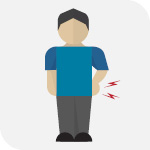Tools and resources
The following tools and resources are designed to assist medical professionals deliver services to work injured patients that are consistent with the Clinical Framework for the Delivery of Health Services- external site.
.
Managing work injuries
Managing Common Concerns - The Flag Model
As the treating medical practitioner, your role includes the coordination of the medical care for your patient. When this care is required as a result of a work injury, there can be other concerns which come into play potentially impacting recovery and return to work. These concerns may be psycho-social, related to employment or related to the claim. To assist you in handling these “flags” we have come with a handout for you with useful statements and actions for you to consider.
Musculoskeletal injuries
Managing physical injuries
Most patients who have a workplace injury will recovery and return to work with minimum intervention. To support recovery and return to work for uncomplicated physical injuries, we have identified a potential pathway which can guide you in your treatment, including considerations and potential actions at varying time points.
Screening for risk
Brief psychosocial risk assessment tools are an effective predictor of poor outcomes. The Örebro Musculoskeletal Pain Questionnaire (ÖMPQ) helps identify patients at risk of developing long term pain related disability, allowing for early intervention.
- Orebro Musculoskeletal Pain Questionnaire (Short)- external site with the Scoring Guide.- external site
Spinal imaging in asymptomatic patients
Imaging evidence of degenerative spine disease, such as disk degeneration, bulges and protrusions, are common in asymptomatic individuals and increases with age and are not necessarily associated with the presence or degree of low back pain. This handout clearly illustrates the estimated percentage of degeneration in asymptotic patients by age and image findings.
The Scans, Activity & Pain Conversation tool
This tool provides a simple framework to accompany and summarise conversations with your patient about common radiological findings (i.e. X-ray, MRI or CT scans) in a way that aims to reassure them about what is normal, and promote healing through movement. Watch this webinar- external site to understand how to use the Scans, Activity & Pain Conversation tool.
- Download the Scans, Activity & Pain Conversation tool- external site.
The 'Back Tracker' for health professionals
This tool will help you talk to your patient about where they are at on the recovery pathway and help to map out the path ahead.
- Download the Back Tracker tool- external site.
OnTrack management tool
The OnTrack tool will help you to manage the progress of patients with complex musculoskeletal conditions, allowing you to critically evaluate and reflect to achieve the best outcomes.
You can use the tool to guide your assessment, management and progress plan, particularly during the initial stages (the first 1-2 sessions) and at key intervals throughout the care of your patient.
Pain
Pain is a common experience for patients, but it’s unique to each individual – no one person’s pain is ever experienced the same. This is because of the complex interactions connecting your body, mind and environment in that moment. It’s a powerful process which can be difficult to explain and manage. The following resources can be a starting point;
Further information and resources on managing pain is available on our website under Pain Management- external site.
Work-related psychological injuries
Managing work related mental health conditions can be challenging for doctors to diagnose and treat. To assist with this, the Clinical guideline for the diagnosis and management of work-related mental health conditions- external site (the Guideline) has been developed. A useful two page GP summary provides a snapshot of recommendations and consensus statements in the Guideline.









 Date printed: 15 Feb 2026
Date printed: 15 Feb 2026

